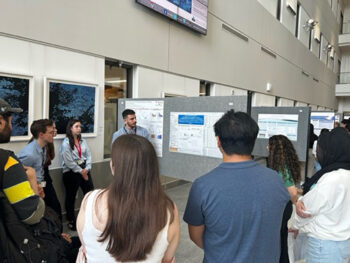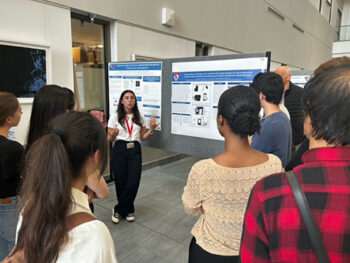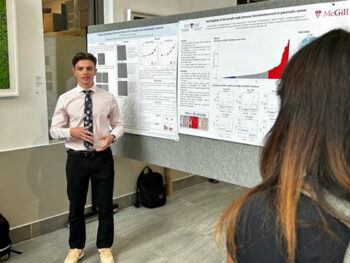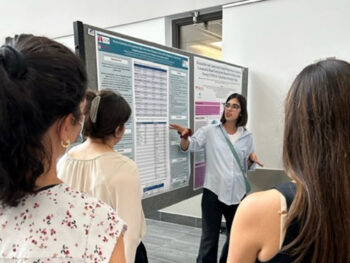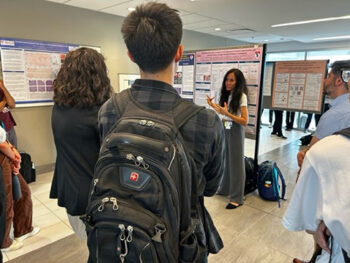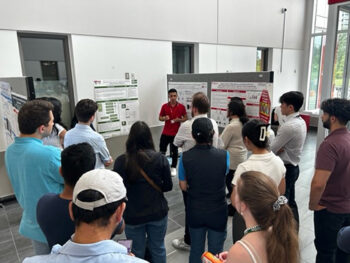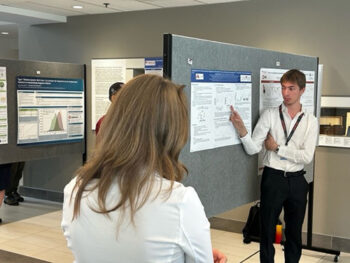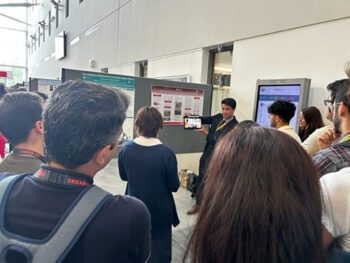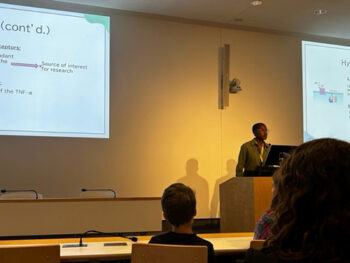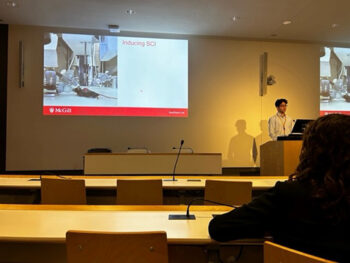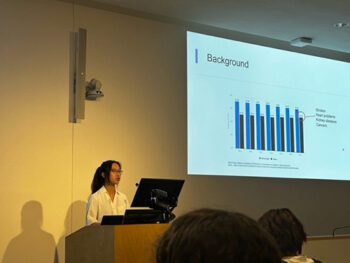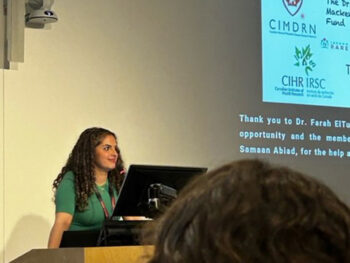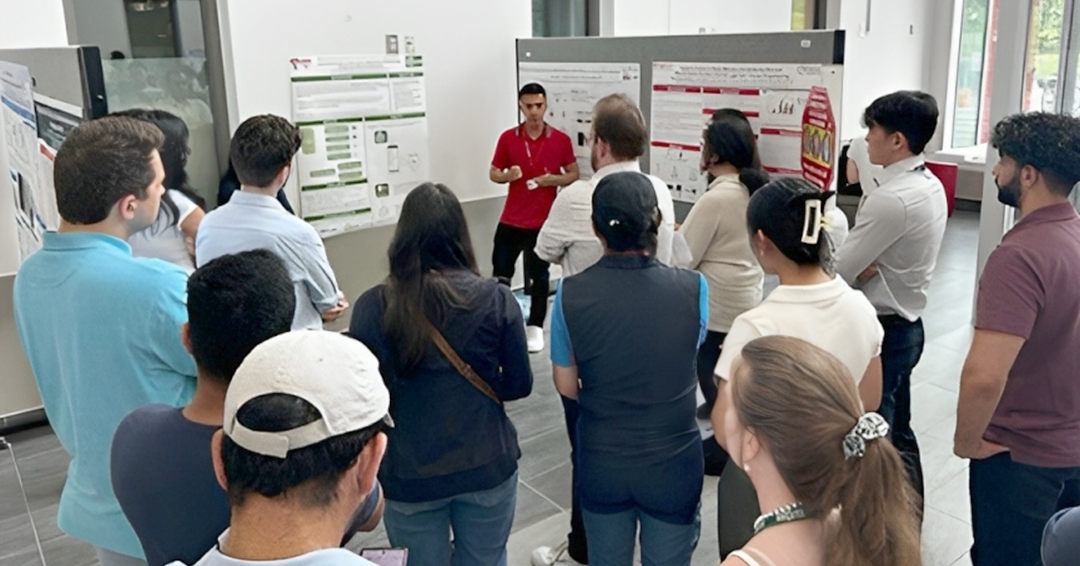
Annual event gives summer students a unique opportunity to present their projects to the research community
It is a summer tradition to welcome undergraduate students to train in some of the cutting-edge research labs at the Research Institute of the McGill University Health Centre (RI-MUHC). Their training culminates with the annual Summer Student Research Day at the end of the summer. This event provides a unique opportunity for undergraduate summer trainees to present the results of their research projects to an audience of their peers and members of the RI-MUHC research community. It offers an inclusive and stimulating learning environment for the students to exchange new ideas and make new connections.
On August 11, the annual Summer Student Research Day enjoyed record-breaking participation at the Glen site of the RI-MUHC. Sixteen students gave oral presentations in the Cruess Auditorium, followed by a lively poster session in the RI-MUHC Atrium, where 65 students presented their projects.
“We’re so impressed with everyone’s work and their accomplishments,” said Dr. Louise Pilote, Deputy Executive Director and Deputy Chief Scientific Officer, RI-MUHC, and a senior scientist in the Cardiovascular Health Across the Lifespan (CHAL) Program, in her opening remarks. “Congratulations to all the students, postdoctoral fellows and supervisors who have made this summer research session so successful. This is a very translational research day, with presentations and posters spanning topics from zebrafish to population health. All these research areas exemplify the RI-MUHC – it allows all of us to learn from each other and to be inspired.”
Chloe Nylligira, from the laboratory of David Stellwagen, PhD (Brain Repair and Integrative Neuroscience (BRaIN) Program), opened with a talk about the tumor necrosis factor alpha (TNF alpha), an inflammatory cytokine, and its role in infection or injury. The first of three presenters from Dr. Pilote’s lab, Claire Grall-Johnson, then presented a talk titled “A Sex-stratified Analysis of Social Determinants of Health and Adverse Cardiovascular Outcomes in Atrial Fibrillation,” which explored how various social behaviours and lifestyle choices affect outcomes in male and female patients with atrial fibrillation. Hanine Bahsoun, a student in Dr. John Mitchell’s lab (Child Health and Human Development (CHHD) Program), presented on mucopolysaccharidoses, a group of rare inherited recessive metabolic disorders classified as lysosomal storage diseases.
Alexander-Darius Miron from Dr. Sarkis Meterissian’s lab (Cancer Research Program (CRP)), followed with a presentation on lymph node dissection in breast cancer patients. The first presentation from the Infectious Diseases and Immunity in Global Health (IDIGH) Program was by Sebastian Grocott, titled “Multidimensional analysis of SARS-CoV-2-Spike-specific CD4+ T cells reveals distinct functional fates linked to protective and pathologic responses.” This study sought to define the immune response triggered by infection or vaccination that protects or predisposes an individual to viral disease. Joshua Hazan Mea, a student in Dr. Chan Gao’s lab (Injury Repair Recovery (IRR) Program), presented on chronic pain in instances of traumatic spinal cord injuries, and Emily Foxman, from the laboratory of Tomoko Takano, MD, PhD (Metabolic Disorders and Complications (MeDiC) Program), presented on the roles of alpha-PIX and beta-PIX in the regulation of Rho GTPases in kidney epithelial cells. The first session concluded with Raphael Goldman-Pham’s talk on “Association of genotype-predicted FGF10 expression and lung function in adults,” which explored the relationship between lung function and a protein known as fibroblast grown factor-10 (FGF10). Goldman-Pham’s research was supervised by Dr. Benjamin M. Smith from the Translational Research in Respiratory Diseases Program (RESP).
Opening the second session, Nicholas Koran presented the use of a genetic approach to identify markers of coronary artery disease, jointly supervised by James Engert, PhD, and George Thanassoulis, MD (both from the CHAL Program). Taylor Morganstein’s presentation on pelvic organ prolapse based on research conducted in Dr. Maryse Larouche’s lab (IRR Program), “Comparison of outcomes between vNOTES vs. laparoscopy approaches to uterosacral ligament suspension for pelvic organ prolapse,” followed.
A trainee in the laboratory of Alexandre Raynaud, PhD (BRaIN Program), Dasha Vanichkina presented on “Investigating the effect of asynchronous target presentation on the efficiency of binocular summation,” while Nikhil Jaiswal’s presentation, “Patient and Stakeholder Engagement in Responsible Healthcare Chatbot Development: A Research Perspective,” explored the development of large-language models in artificial intelligence-powered medical chatbots. This work was done under the supervision of Bertrand Lebouché, MD, PhD (IDIGH Program).
Shreya Udupa of Dr. Jacques Lapointe’s lab (Cancer Research Program) presented on the identification of prognostic biomarkers in prostate cancer, while Divya Kakkar, who studied under Dr. Thomas Kitzler (CHHD Program), presented her project, “Use of zebrafish to resolve genetic findings of uncertain significance in primary ciliary dyskinesia,” which relates to the autosomal recessive orphan disease known as PCD. A talk on “Ivacaftor delivery using polymeric nanocarriers improves cellular response to CFTR correctors,” by Ella Boone, supervised by John Hanrahan, PhD (RESP Program), followed, and Shuang Wang, who was supervised by Paul Sabatini, PhD (MeDiC Program), closed out the presentations portion of Summer Student Research Day with the topic, “Uncovering a novel central pathway regulating body weight.”
Among the poster presenters was Jérôme Genzling, doctoral student in the Department of Chemistry at McGill University. Genzling recently won a Chessable Research Award for his presentation, “Checkmating Pain: Exploring the Links Between Flow Experience, Chess, and Pain Modulation.” Chessable is the world’s leading dedicated learning platform for chess.
“We are deeply impressed by the quality of all the posters and presentations, the professionalism of the summer students and the scientific curiosity they have demonstrated,” said Marie-Claude Gingras, manager of the Cancer Research Program, in closing remarks. “Their enthusiasm is inspiring, and it is so encouraging that these summer students represent the future of research at the RI-MUHC.”
Congratulations to everyone who participated in this event, particularly to the summer students, and to their supervisors and colleagues who provided such valuable support and training throughout the season.
This event was realized thanks to the exceptional efforts of the 2023 Organizing Committee: Emily Bell, Ariel de Roo, Marie-Claude Gingras, Inga Murawski and Fanny Toussaint.
